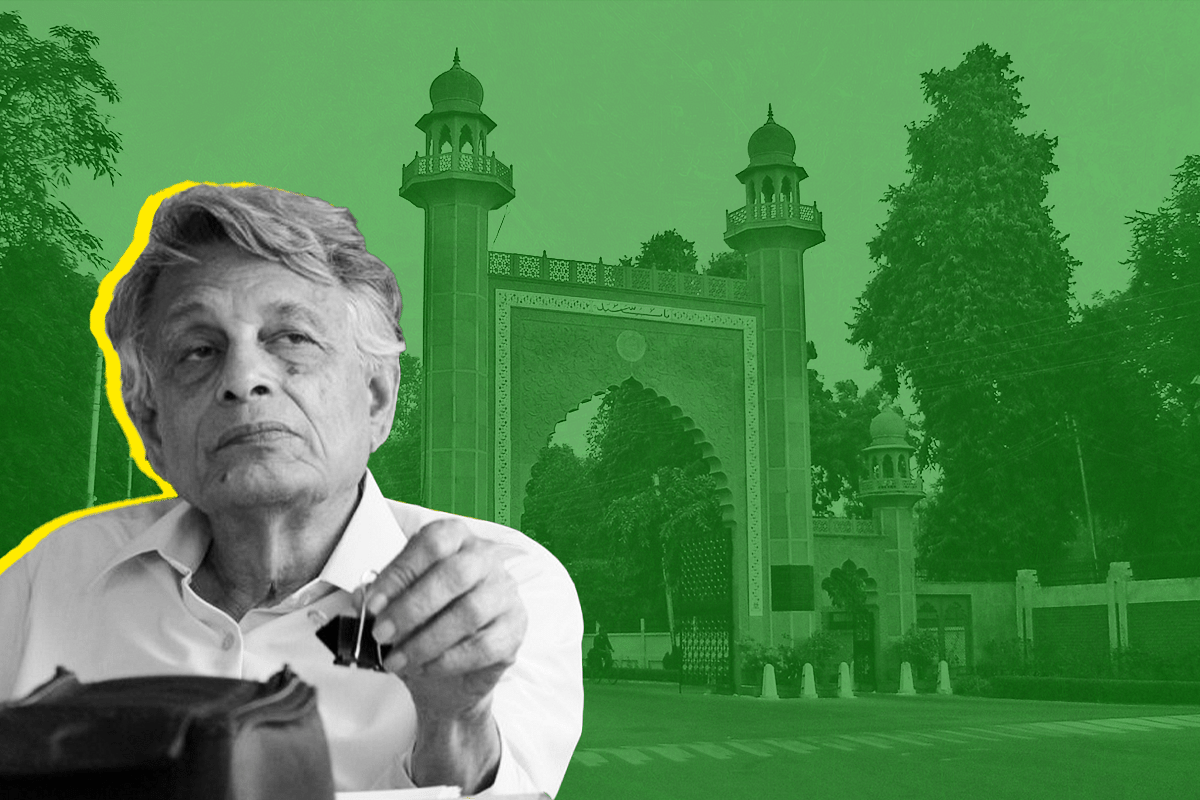Politics
Historian Irfan Habib Says 'Marathas Gave Aligarh Its Name'- Maratha History Researcher Says 'Not True'

Historian Irfan Habib (Amber Habib/Wikipedia)
Historian Irfan Habib’s claim of the Maratha Confederacy having decided to christen Aligarh as it is known today has once again brought the Uttar Pradesh government’s efforts to revert back the names of several cities and towns to their original names into spotlight.
In a recent interview to The Telegraph, Habib, Professor Emeritus of History at the Aligarh Muslim University (AMU), criticised the re-naming of cities and towns by BJP-led state governments across India. However, what has caught the attention of several Maratha history aficionados and researchers is Habib’s claim of Marathas having taken the initiative to name his home town Aligarh, located in the western region of Uttar Pradesh.
“There was a cantonment where AMU stands now. The Marathas called it Aligarh after the name of their supporter, Nazaf Ali Khan. Do they [the BJP] want to erase their own history?,” the daily quotes the widely discredited historian as saying.
Habib said this in the context of the BJP-led Aligarh Municipal Corporation’s recent resolution requesting the Chief Minister Yogi Adityanath to rename Aligarh as Harigarh.
What Do The Contemporary Sources Say ?
Pune-based history researcher Shivaram Karlekar has now pointed out that, contrary to Habib’s claim, it wasn’t the Marathas but Afrasyab Khan, a slave-turned-deputy of the senior-most Delhi-durbar courtier Mirza Najaf Khan, who gave Aligarh its name in the late 18th century.
“If we look at the contemporary correspondences of the senior most Maratha general in the north- Mahadji Shinde, it becomes amply clear that Aligarh was known as Ramgarh in the medieval period. It must have been known as Harigarh in the period before. But when it comes to the present-day name, it can be clearly ascertained, from a letter written by Shinde, that it was Afrasyab Khan who renamed Ramgarh as Aligarh,” Karlekar said speaking to Swarajya.
The Maratha history researcher has referred to a correspondence reproduced in the G S Sardesai edited compilation of Mahadji Shinde’s letters and notings.
The compilation is titled ‘Historical Papers Relating To Mahadji Sindia.’
The translation of an excerpt related to Aligarh in the original Marathi letter enumerated as 363 in the compilation reads as follows:
“There is a place named Ramgarh in the Antarvedi region (i.e. the region between river Ganga and Yamuna). Afrasyab Khan has now renamed it as Aligarh.”
Afrasyab Khan, who is also mentioned in the Mathura Gazetteer, was the successor to the estates of Mirza Najaf Khan, who served as the Vaki-I-Mutaliq of the Mughal empire before his death.
The estates inherited by Afrasyab included the present-day Aligarh and surrounding villages. The Gazetteer notes that Afrasyab had served as a Vazir of the empire for a brief period, albeit a nominal one since the real power in northern India was vested with Marathas represented by Mahadji Shinde.
Karlekar points out that a noting in the compilation of Shinde’s letters mentioned above shows that Afrasyab was the son of a Baniya merchant who was abducted by Najaf Khan, converted to Islam and made a slave.
“Mahadji Shinde’s letter enumerated as letter number 311 shows that the former allied with Afrasyab only because the region under the latter’s control was a strategic one and Marathas were keen to avoid it getting into the hands of their opponents. Particularly, Afrasyab was at the risk of squandering away the same under the influence of the British who had steadily started asserting their presence in the Mughal court,” Karlekar said.
“Merely because Maratha general Shinde was in alliance with Afrasyab, that too for a brief period (as Afrasyab was assassinated by an opponent soon after the alliance), does not in any way imply that it was the Marathas who named the town Aligarh as it’s known today.
Something like this is not expected from a renowned historian like Prof Habib. He needs to get his facts right,” he added.
Also Read:
Support Swarajya's 50 Ground Reports Project & Sponsor A Story
Every general election Swarajya does a 50 ground reports project.
Aimed only at serious readers and those who appreciate the nuances of political undercurrents, the project provides a sense of India's electoral landscape. As you know, these reports are produced after considerable investment of travel, time and effort on the ground.
This time too we've kicked off the project in style and have covered over 30 constituencies already. If you're someone who appreciates such work and have enjoyed our coverage please consider sponsoring a ground report for just Rs 2999 to Rs 19,999 - it goes a long way in helping us produce more quality reportage.
You can also back this project by becoming a subscriber for as little as Rs 999 - so do click on this links and choose a plan that suits you and back us.
Click below to contribute.
Latest